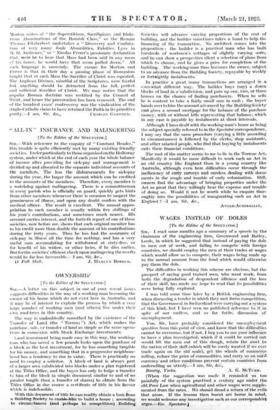OWNERSHIP
[To the Editor of the SPECTATOR.] SIR,—A letter on this subject in one of your recent issues suggests difficulties in the way of a working man becoming the owner of his home which do not exist here in Australia, and it may be or interest to explain the process by which a very large number of working men (and others- ) live under their own roof-trees in this country.
The way is: undoubtedly smoothed by the existence of the Transfer of Land: _(the " Torrens ") Act, which makes the purchase, sale, or transfer of land as simple as the same opera- tions in connexion with Stock Exchange investments.
Land investment.being made easy in this way, the working- man who has saved a few pounds looks upon the purchase of a block as the best investment, for he has something tangible for his money, and something that in a progressive neighbour- hood has a tendency to rise in value. There is practically no need. to employ .a solicitor. A. block of land is always part of a -larger area subdivided into blocks under a plan registered at the Titles Office, and the 'buyer has only to lodge a transfer to Mini of the block (a simple document similar to and of no greater length than a transfer of shares) to obtain from the Titles Office in due course a certificate of title in his favour
which is indefeasible. .
With this document of title he can readily obtain a loan from a Building Society to enable-him to build a house ; according to eireturi.lances (and perhaps to competition) Building
Societies will advance varying proportions of the cost of building, and the builder sometimes takes a hand to help the financing of the transaction. No architect domes into the proposition ; the builder is a -praefical 'man Who has built hundreds of Workmen's 'cottages of slightly varying sorts, . and he can shOw a prospective client a selection Of plans from - which to-chOose, and be gives a price for coinpletion-- of the building. The working-man thus becomes the owner, subject to an advance fiOm the Building Society, repayable by Weekly or fortiightly instalments.'
_.In _practice a great: many transactions are arranged in a
somewhat different way. The bailer_ (say) a dozen blocks of land in asubdivis. ion, and putsup one, two, or three houses on the chance of finding purchasers. When he sells he is content to take a fairly small sum in cash ; the buyer hands over to him the amount adVanced by the Building Society mad gives a second mortgage for the balance of the purchase money, with or. without bills representing that balance, which in any case is payable by instalments at short intervals.
Although I have dealt with the working-man's home as being the subject specially referred to in the Spectator correspondence, I may say that the same procedure (varying a littleakcording to circumstances) is followed by the clerks, shop assistants, and other salaried people, who fmd that buying by instalments suits their financial conditions.
The root of the matter seems to me to lie in the Torrens Aet. Manifestly it would be more difficult to work such an Act in an old country like England than in a. young country like Australia, although even here difficulties occur through the inefficiency of early surveys and careless dealing with docu.- ments in the rough and tumble of early colonization. Still, owners find the advantage of bringing properties under the Act so great that they willingly bear the expense and trouble of doing so. Would it not be worth while to enquire thor- oughly into the possibilities of inaugurating such an Act in
England am, Sir, &e., ANGLO-AUSTRA.LIAN.






















































 Previous page
Previous page